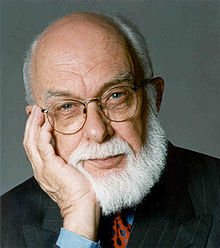More Magic
I. In my last journal I wanted to know more about the training/schooling that magicians recieve. After doing some research I found that there are both online courses (i.e. MagicianSchool.com) and magic schools (i.e. The Magic College) that can help an aspiring magician achieve a career in the field.
II. The schedule recently has been really crazy due to SOLs, and because of that, we havent had very many classes. Therefore, there isnt very much to talk about. We're still in the magic unit and we've watched a lot of interesting videos. Some have been about magicians and some about psychics. We've studied how the two fields of magic and psychology are related. We've uncovered many of the hidden secrets of individuals that claim to possess psychic powers. One man, James Randi, is a scientific skeptic and stage magician who challenges paranormal claims. We watched an interesting film that validates his claims. We also watched a film about alternative medicines.
James Randi - Wikipedia, the free encyclopedia. (n.d.). Wikipedia, the free encyclopedia. Retrieved May 30, 2011, from http://en.wikipedia.org/wiki/James_Randi
I think this unit has been a lot of fun. It's been cool to have some of the secrets revealed to us. I think the most interesting part of this unit is the "psychic surgery". I have never seen anything like that before, and it's honestly believable until you see the secrets uncovered. I also thought the film about alternative medicines was extremely intriguing. I wasn't aware that people used bee stings as a form of therapy until now. It's unique how the "doctors" that issue these forms of healing legitimately believe in them. The bee lady was entirely convinced that bee stings were saving her life and the lives of her patients. I personally am not sure if I believe that voodoo and chanting and everything like that is actually effective.
Psychic Development - Mediumship course and Healing in the Philippines. (n.d.). Psychic Surgery Anatomy & Physiology, Body Massage, Oriental Diagnosis, Health supplies Reiki initiations. Retrieved May 30, 2011, from http://www.therapies.com/surgery/medium.htm
One thing that the alternative medicine video didn't ever show is the claims of the "doctors" that actually manipulate people into trusting them. What do those people say to convince their patients that they can heal them? Do they say they're possessed by a spirit? Do they say that they have special supernatural powers? I can't see myself every buying into something like that, so I'm interested to know what those chanters and psychic surgeons have to do to get people to believe them.
What Are The Conditions That Can Be Treated With Bee Venom Therapy?. (n.d.). Alternative Medicine and Alternative Health. Retrieved May 30, 2011, from http://www.altmedicinezone.com/alternative-treatment/what-are-the-conditions-that-can-be-treated-with-bee-venom-therapy/
III. For next week's journal I want to know what are some other forms of alternative medicine. The video presented us with a breif overview but I'm curious to know what some other specific examples are besides bee stings.





